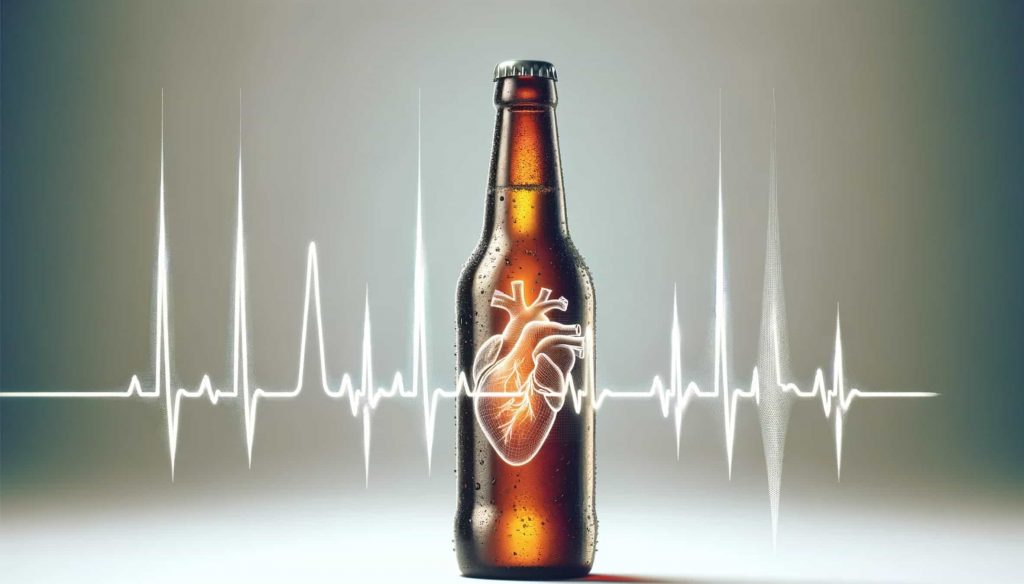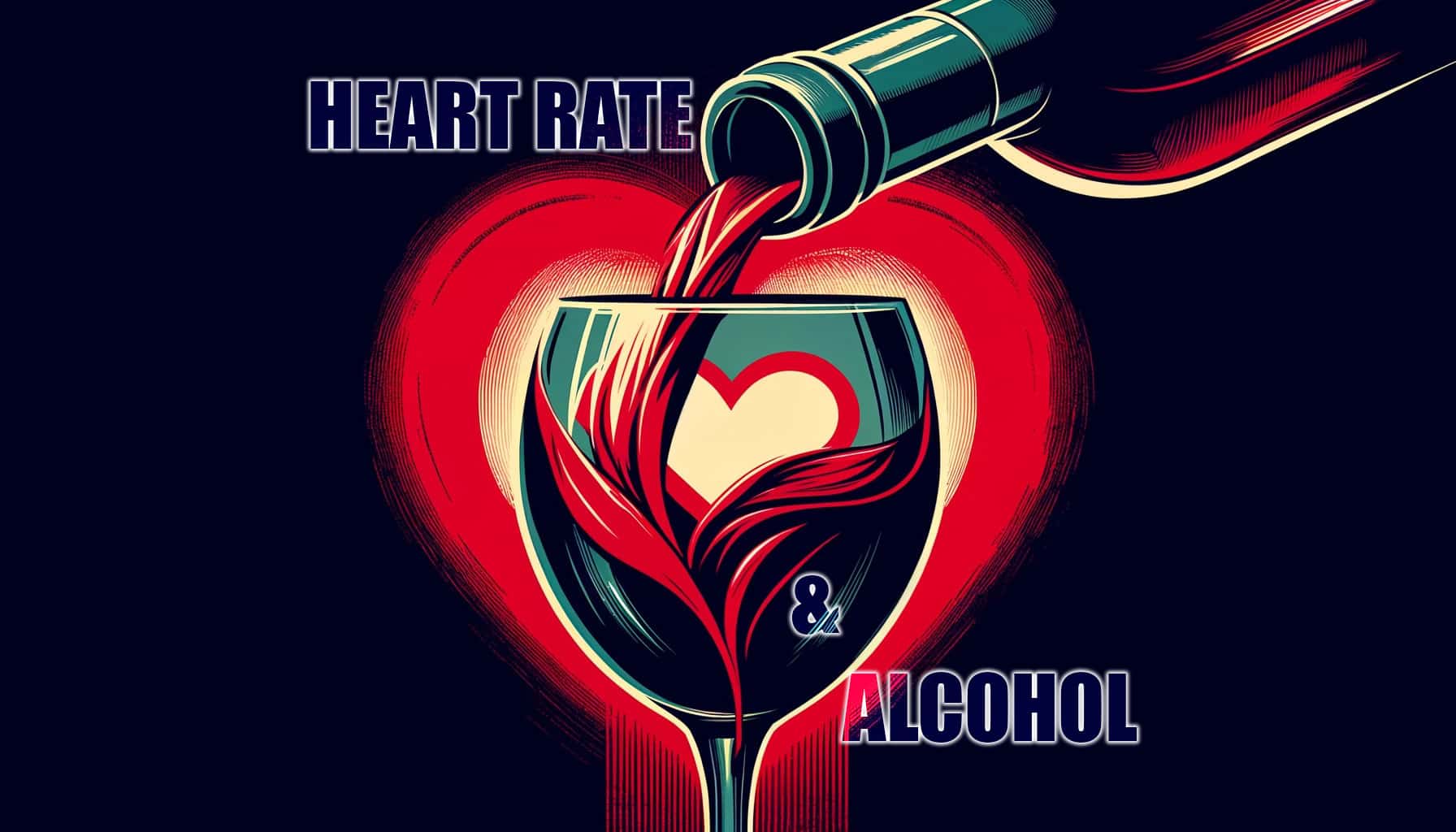The link between alcohol and resting heart rate is fascinating and contradictory. On the one hand, alcohol is used by many as a de-stressor. A drink or two can lower stress, which coincides with a lower resting heart rate.
On the other hand, long-term heavy alcohol use has a whole host of negative side effects. Liver damage, weakened nervous system, heart failure, cancer, and whole lot more. However, studies do show there is a fine balance here.
Why Does My Heart Chill Out When I Drink?

So, let’s dive into the heart of the matter—no pun intended. Recent studies show that alcohol actually reduces stress levels in your brain. This is because it’s a depressant, and it throws a wet blanket over our central nervous system, slowing everything down and giving us that cozy, mellow vibe.
As you sip your drink, your heart rate tends to drop. This slowdown is thanks to alcohol interacting with the parasympathetic nervous system—our body’s own chill-out zone—which oversees our rest-and-digest functions.
But here’s the kicker: while a little bit of alcohol might make your heart take a breather, going overboard can lead to some not-so-great effects. You see, while your heart’s taking it easy, other parts of your body might be starting to fret about the long-term party going on.
Alcohol and Resting Heart Rate – A Long-Term Journey
Initially, alcohol might make your blood vessels get a bit lazy and wide, which can drop your blood pressure and keep your heart rate low. But, throw back a few too many, and you could end up with arrhythmias. These can just be a temporary buzzkill, but if they keep up, they might put your ticker at risk long-term.
Now, when we talk about the long-term, having 1-2 drinks every night to reduce stress can lead to severe consequences in the future. Studies show that excessive drinking can lead to higher blood pressure, cardiovascular disease, heart attacks many other illnesses. It’s not pretty.
The Paradox of the Pulsing Parasympathetic
Back to our parasympathetic nervous system—it’s usually the hero of our story, helping us relax and digest our food. When alcohol boosts this system, it’s like turning on the “chill mode” in your body, and your heart rate goes down. It’s the same peaceful feeling you get from a warm bath or meditating.
The problem arises when the effects of alcohol take this too far, making our heart rate too relaxed, especially if you’re a frequent visitor to the bar. This can mess with your heart rate variability (HRV) also, which is a measure of how well your heart can switch gears from beat to beat.
Heart Rate Variability and Alcohol

Before we mix alcohol into the equation, let’s get a grip on a crucial aspect of our cardiac health—Heart Rate Variability (HRV). HRV is the measure of the tiny variations in time between each heartbeat. Think of it as the rhythm section of your body’s own internal band.
A healthy, variable heart rate is like a band that can play a dynamic range of styles, adjusting smoothly to the needs of the moment. High HRV means your heart is responsive and adaptable, ready to hit the high notes when excited and mellow out when it’s time to relax.
How Alcohol Affects HRV
Alcohol and resting heart rate actually have a similar relationship as alcohol and HRV. One, maybe two drinks in, HRV is lowered. Which is good. A high HRV means you’re in fight or flight mode. So, let’s say you were sky diving or being attacked by a bear. Your HRV would be heightened.
Lower HRV is associated with relaxing. like a day at the spa. The heart isn’t working overtime, and that’s why some see alcohol as a stress reliever. But in the long-run, HRV can become more sporadic. Even if you don’t think you’re addicted, your heart will operate as if you’re in withdrawal.
Becoming too dependent on alcohol as your anti-depressant is obviously not a good thing.
Chronic impacts are even more disconcerting. Regular heavy drinking can lead to consistently low HRV, which is linked to an increased risk of developing cardiovascular diseases. This includes hypertension, coronary artery disease, and potentially heart failure. It’s like having a conductor who only knows one song and plays it on loop, wearing out the band and never allowing for creative expression or rest.
Listen to Your Heart—Literally
If you’re tuning into your body’s signals, you’ll notice that factors like your age, weight, and general health tune the effects of alcohol on your heart rate. And it’s not just about how much you drink, but what you drink and how fast. Downing five shots at a party? Your heart’s going to have a different response than if you sip a single glass of wine with dinner.
Speaking of types of drinks, did you know red wine, in moderation, comes with antioxidants that might actually play some defense for your heart? But remember, the key word here is moderation.
Tipsy Tips for Keeping a Healthy Beat
If you do decide to drink, keep these heart-smart tips in mind:
Keep track: Know how much you’re drinking and aim to keep it moderate.
Stay hydrated: Alcohol dehydrates you, which can mess with your heart rate, so water up!
Slow and steady: Enjoy your drink slowly to reduce the impact on your heart.
Know when to say no: Recognize your limits to avoid stressing your heart.
Wrapping It Up: Heart Health on the Rocks?
In essence, while the occasional drink might help you unwind and even keep your heart rate in a sweet spot, overindulgence can flip the script, leading to serious heart issues. It’s all about balance and knowing how your body handles alcohol.


“One, maybe two drinks in, HRV is lowered. Which is good. A high HRV means you’re in fight or flight mode. So, let’s say you were sky diving or being attacked by a bear. Your HRV would be heightened.
Lower HRV is associated with relaxing. like a day at the spa.”
I believe that you got it backwards. From my understanding of HRV, higher is better. A low HRV means you’re in flight or fight mode. Higher HRV is associated with relaxing.
You are absolutely right higher HRV is better, I will make some corrections to my posting. Thank you!